Question
During our recent class meeting, we discussed whether big tech today might be violating anti competitive laws in USA/Canada. Governments (EU and USA in particular)
During our recent class meeting, we discussed whether big tech today might be violating anti‐ competitive laws in USA/Canada. Governments (EU and USA in particular) point to the fact that Top 10 tech firms are monoliths, with net profits of $261 billion and the combined cap of nearly 4 trillion. This mammoth size gives them way too much power, thus opening the door to monopolistic practices and other forms of anti‐competitive behaviour.
Governments point to the fact that the big‐10 dominate global markets to the point of being pure monopolies. Apple, Google, Amazon, Netflix and Microsoft are viewed as the main culprits. The EU has decided that iOS and Android operating systems are two separate and independent monopolies with virtually 100% market share of their respective markets. Furthermore, the governments take the position that these companies make insider, sweetheart deals. Google for instance, pays Apple $10 billion a year to keep Google as the default search engine on Apple devices. Epic Games is currently suing Apple for indulging in "unfair competition," price gouging, stifling competition and behaving like a monopoly. Why? Because to sell their game on the App store, they are required to pay an exorbitant fee of 30% for each download. Apple counters, "go sell somewhere else;" Epic says they have no choice.
Common sense also suggests a mutually‐assured‐destruction kind of pact between the Big‐boys‐club. We use our Apple phones to use google search to look for products, followed by a trip to Amazon mall
and then talking about it or reviewing it on Facebook. Therefore, they are inclined to protect each other.
In response, big tech uses counter arguments that are well known and used many times before. They say they compete vigorously and that the playing field is open to new entrants. FB says that Apple is its biggest competitor. In fact, FB runs attach ads against Apple's privacy settings, that they claim hurts small business (and of course them.) Facebook on the other hand is attached for playing fast‐and‐loose with their user data. Walmart and Disney are encroaching on their tuff, they say, with online stores and video streaming. Even small players like Shopify, they claim are nipping at their heels.
Industry analysts point to the fact that Boolean logic of "or" is being replaced by "and," meaning that the big 10 no longer have a defined turf. Their core business is "everything" and this is the new competitive landscape. Thus, Amazon is lusting to enter the social media club. Since they already have a network of millions of buyers and sellers - all eager to chat and discuss products and ideas, the concept of a social network is only a step away. Apple dreams of revamping their Siri to a full‐fledged search engine (and this scares Google). Similarly, Amazon also dreams of expanding their product search algorithms to create a full‐fledged search engine. Amazon's Web Service (ABS) is threatened by all big players and many small ones like Shopify. And, all of big‐10 and their cousins are priming to fight it out in electric cars, navigation systems, and artificial intelligence (AI) arenas. That is intense competition, is it not?
Questions:
1. Take position on whether Big-10 tech firms are colluding or competing? Defend your position. Be as specific as possible - by relating your answers to anti-competitive legislation in US/Canada.
2. Draw out the "product map" (core, tangible, and augmented) for any one of the products of any one of the big 10 tech firms. If the map discussed in class does not "fit", then improvise.
References:
1.
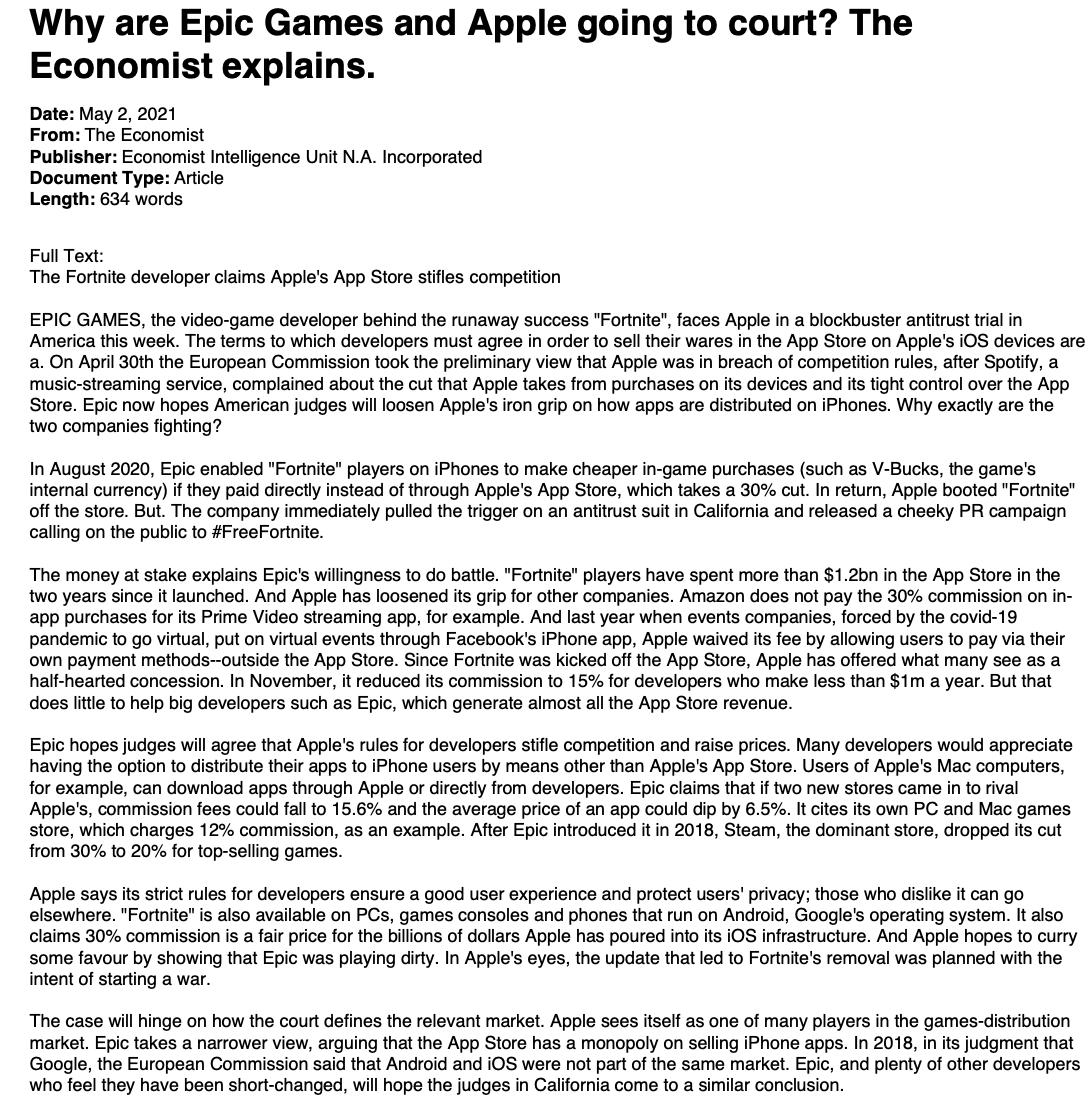
2.
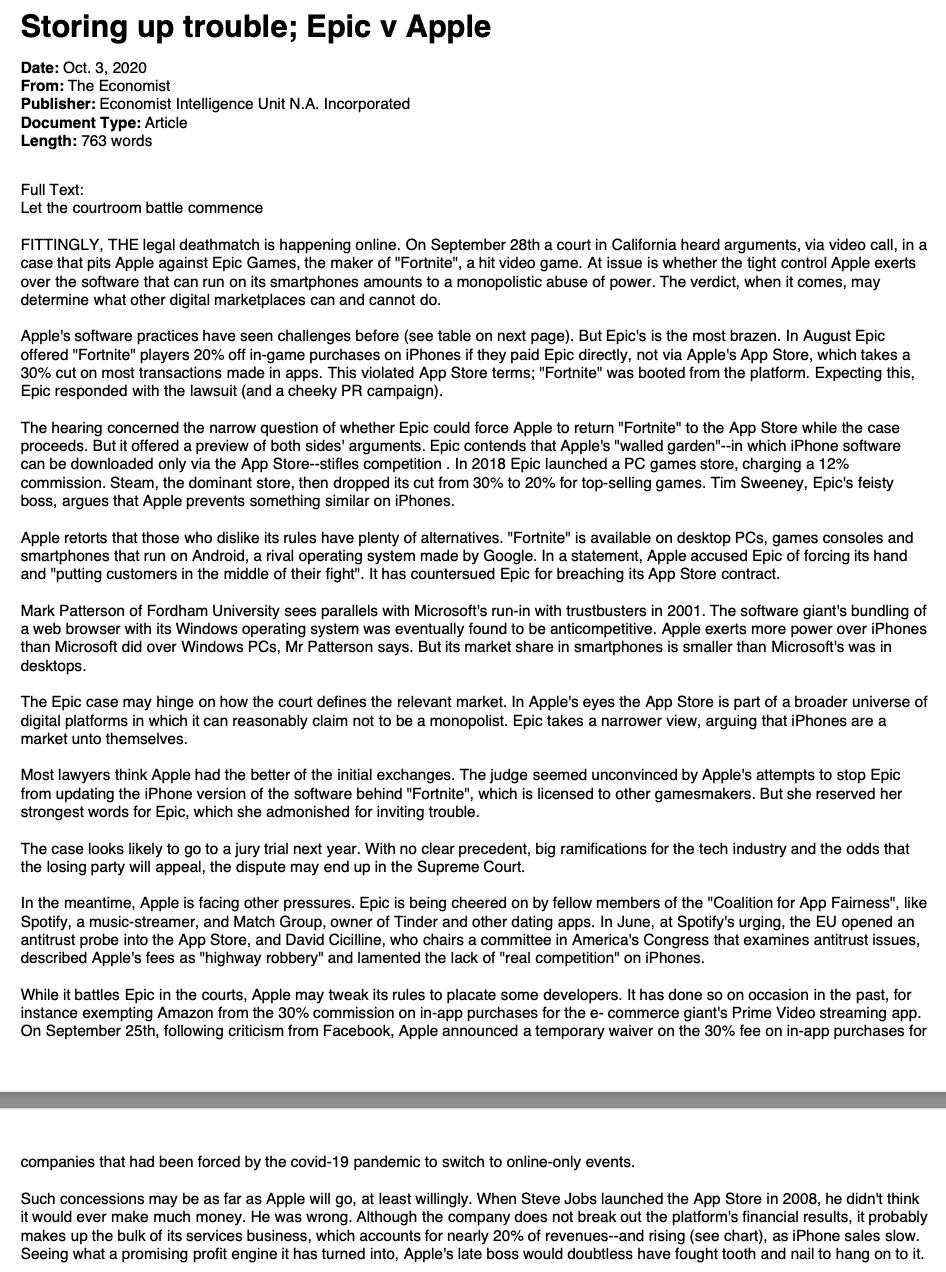
3.
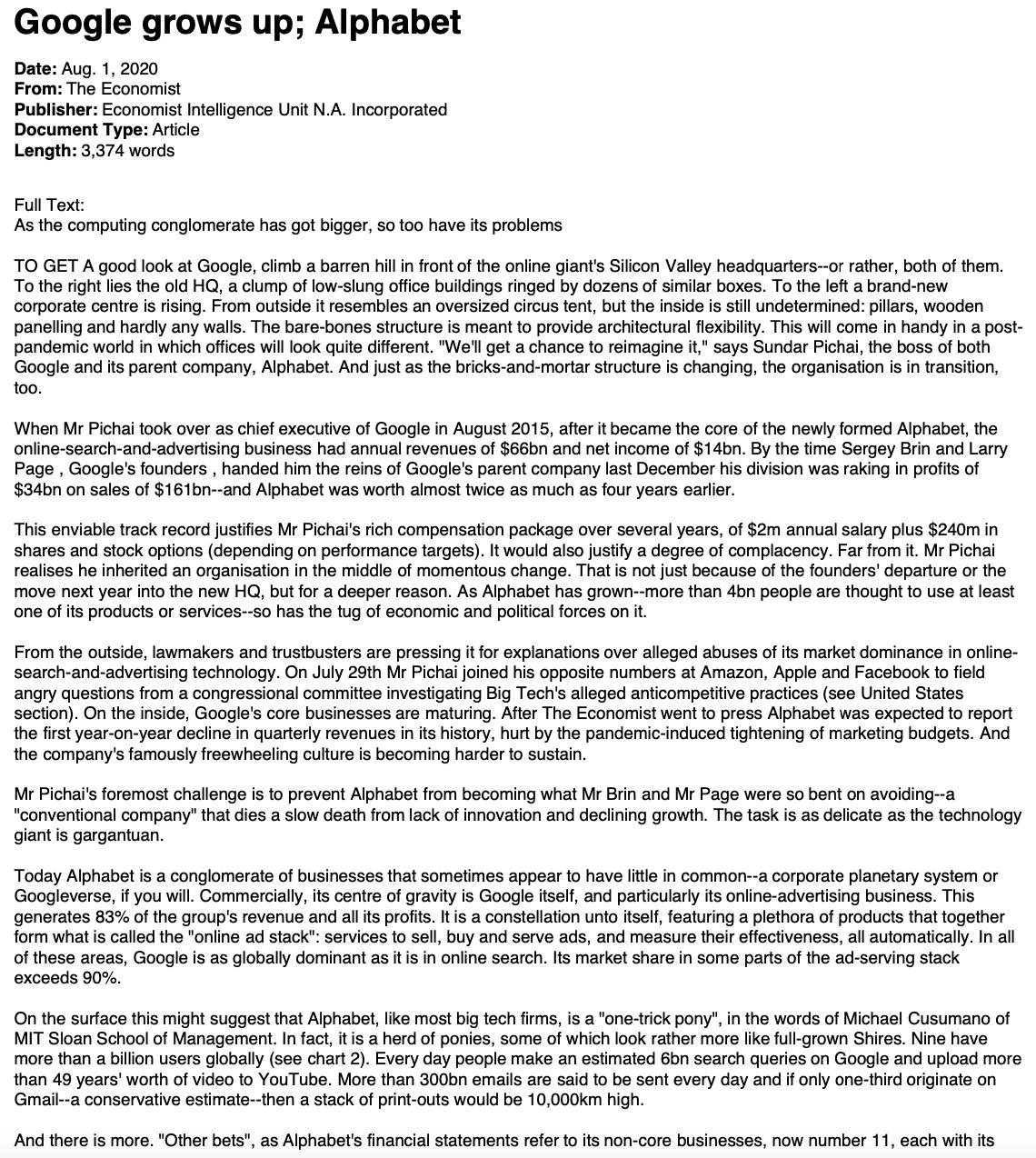
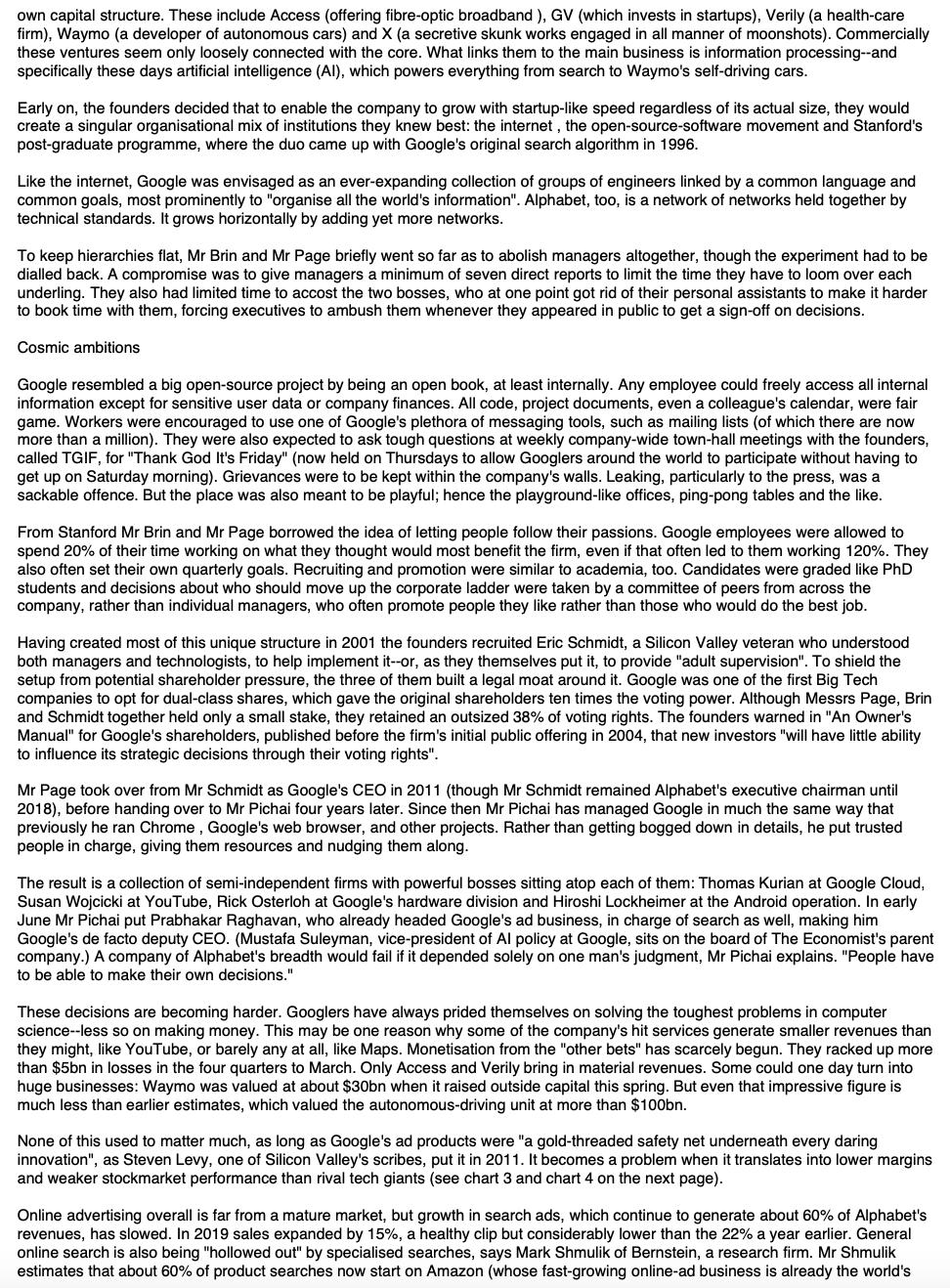
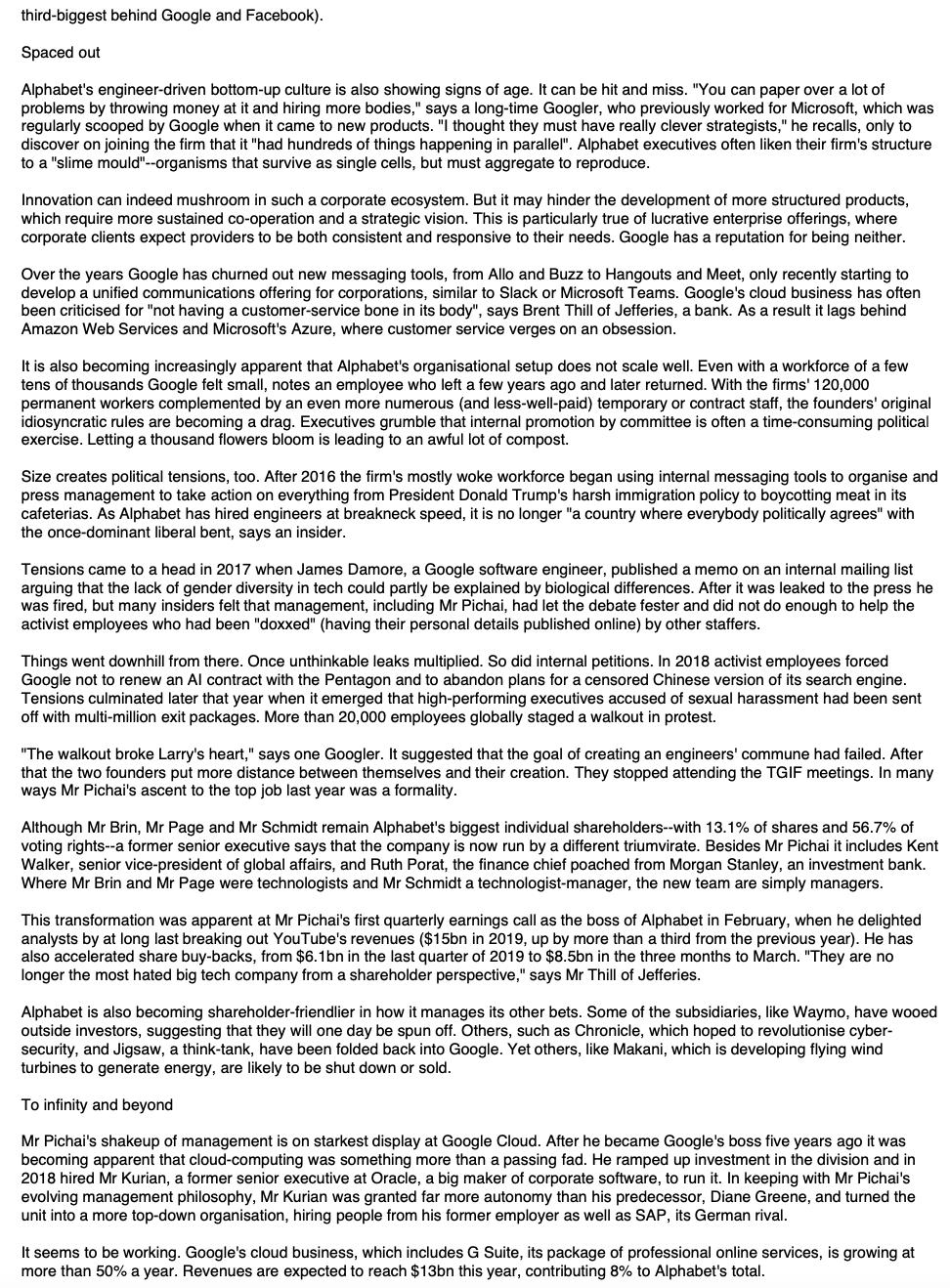
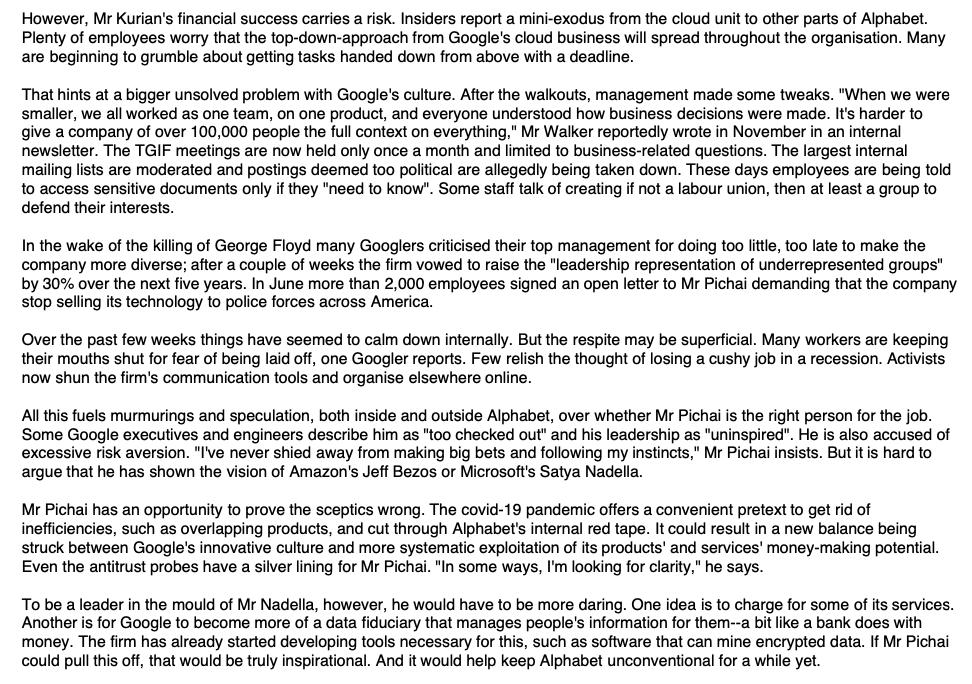
4.
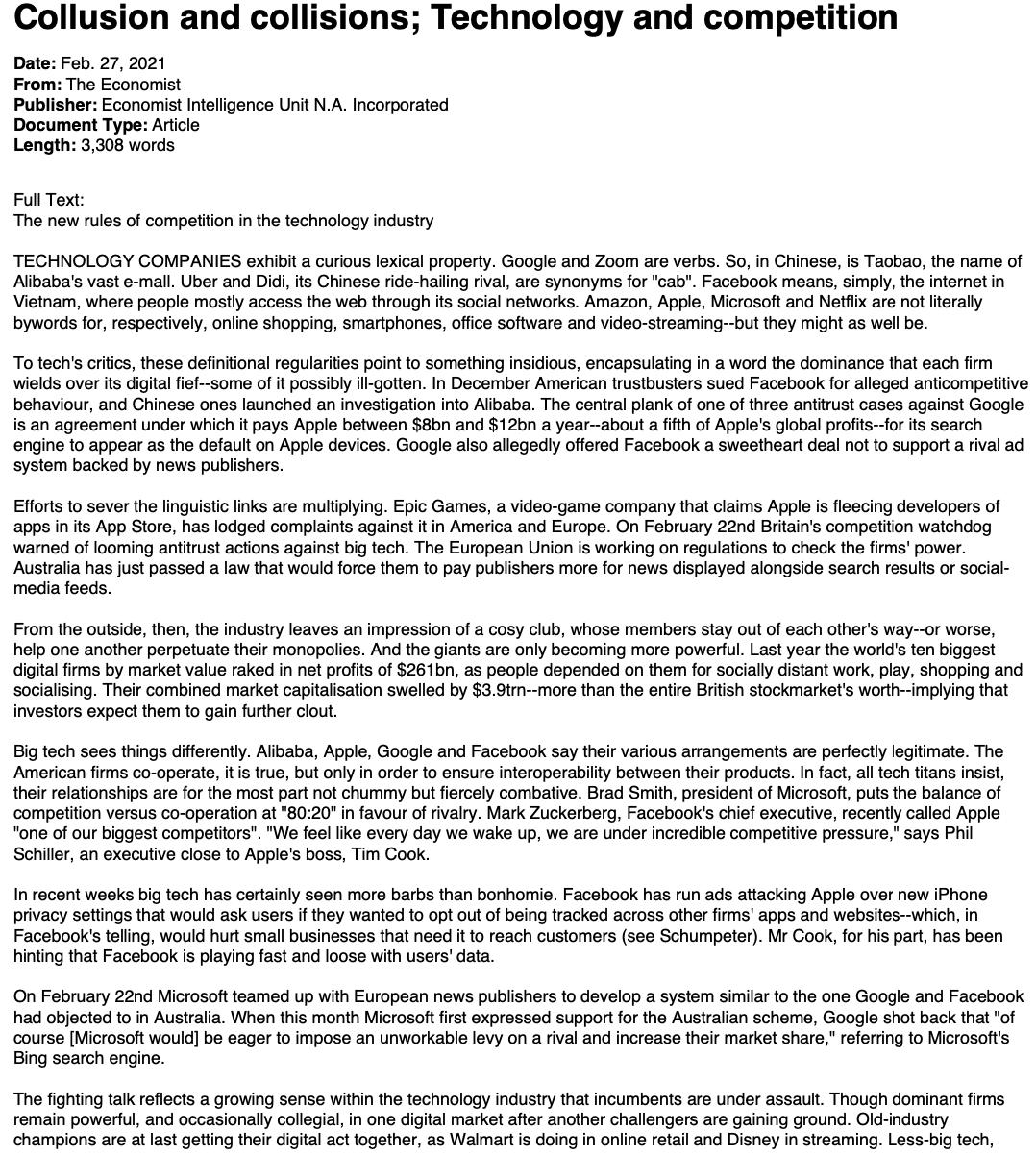
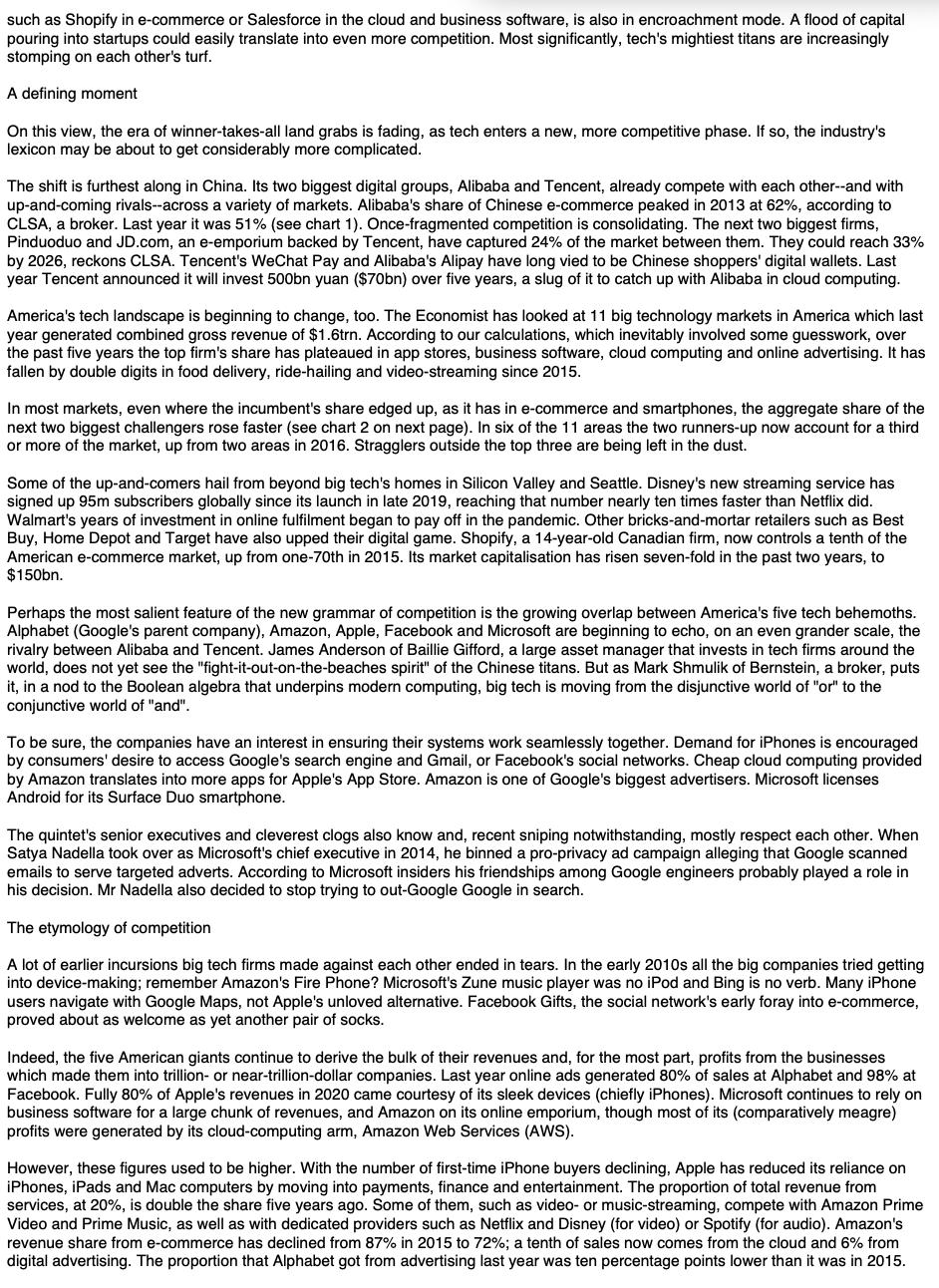
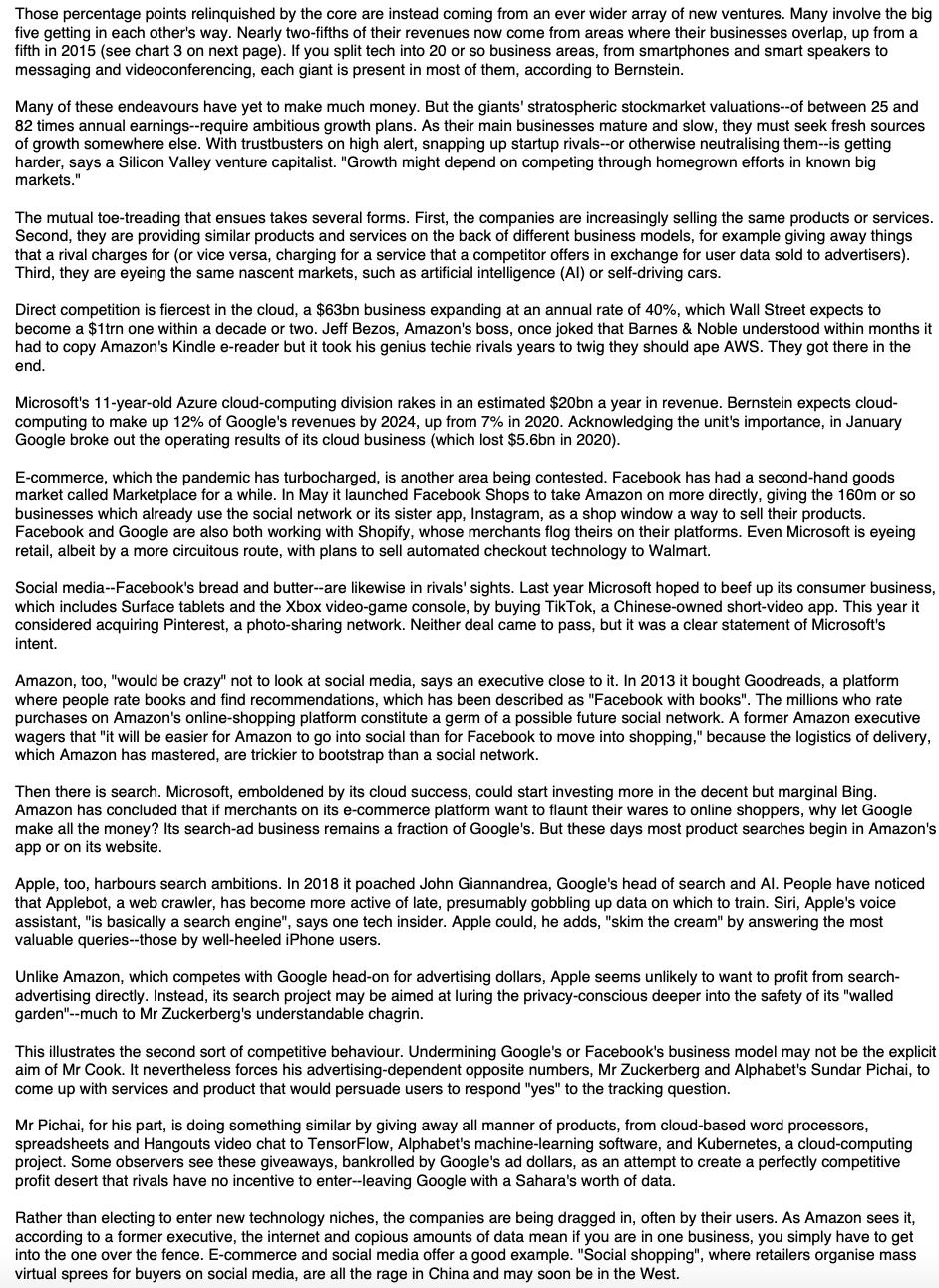
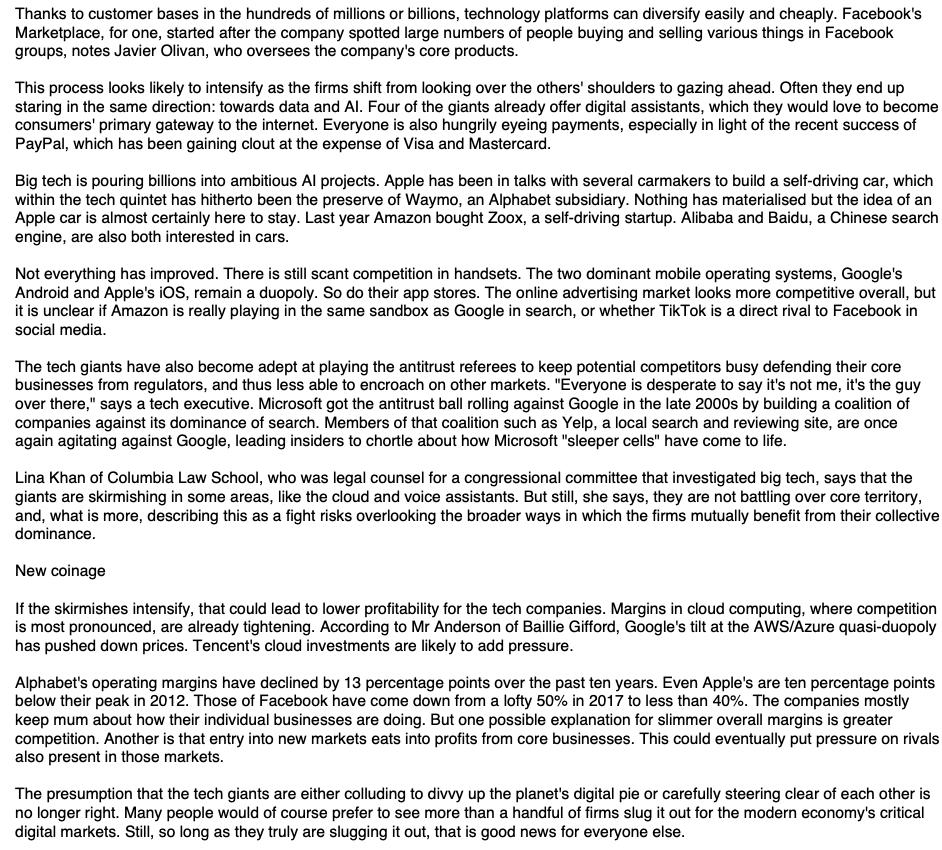
Why are Epic Games and Apple going to court? The Economist explains. Date: May 2, 2021 From: The Economist Publisher: Economist Intelligence Unit N.A. Incorporated Document Type: Article Length: 634 words Full Text: The Fortnite developer claims Apple's App Store stifles competition EPIC GAMES, the video-game developer behind the runaway success "Fortnite", faces Apple in a blockbuster antitrust trial in America this week. The terms to which developers must agree in order to sell their wares in the App Store on Apple's iOS devices are a. On April 30th the European Commission took the preliminary view that Apple was in breach of competition rules, after Spotify, a music-streaming service, complained about the cut that Apple takes from purchases on its devices and its tight control over the App Store. Epic now hopes American judges will loosen Apple's iron grip on how apps are distributed on iPhones. Why exactly are the two companies fighting? In August 2020, Epic enabled "Fortnite" players on iPhones to make cheaper in-game purchases (such as V-Bucks, the game's internal currency) if they paid directly instead of through Apple's App Store, which takes a 30% cut. In return, Apple booted "Fortnite" off the store. But. The company immediately pulled the trigger on an antitrust suit in California and released a cheeky PR campaign calling on the public to #FreeFortnite. The money at stake explains Epic's willingness to do battle. "Fortnite" players have spent more than $1.2bn in the App Store in the two years since it launched. And Apple has loosened its grip for other companies. Amazon does not pay the 30% commission on in- app purchases for its Prime Video streaming app, for example. And last year when events companies, forced by the covid-19 pandemic to go virtual, put on virtual events through Facebook's iPhone app, Apple waived its fee by allowing users to pay via their own payment methods--outside the App Store. Since Fortnite was kicked off the App Store, Apple has offered what many see as a half-hearted concession. In November, it reduced its commission to 15% for developers who make less than $1m a year. But that does little to help big developers such as Epic, which generate almost all the App Store revenue. Epic hopes judges will agree that Apple's rules for developers stifle competition and raise prices. Many developers would appreciate having the option to distribute their apps to iPhone users by means other than Apple's App Store. Users of Apple's Mac computers, for example, can download apps through Apple or directly from developers. Epic claims that if two new stores came in to rival Apple's, commission fees could fall to 15.6% and the average price of an app could dip by 6.5%. It cites its own PC and Mac games store, which charges 12% commission, as an example. After Epic introduced it in 2018, Steam, the dominant store, dropped its cut from 30% to 20% for top-selling games. Apple says its strict rules for developers ensure a good user experience and protect users' privacy; those who dislike it can go elsewhere. "Fortnite" is also available on PCs, games consoles and phones that run on Android, Google's operating system. It also claims 30% commission is a fair price for the billions of dollars Apple has poured into its iOS infrastructure. And Apple hopes to curry some favour by showing that Epic was playing dirty. In Apple's eyes, the update that led to Fortnite's removal was planned with the intent of starting a war. The case will hinge on how the court defines the relevant market. Apple sees itself as one of many players in the games-distribution market. Epic takes a narrower view, arguing that the App Store has a monopoly on selling iPhone apps. In 2018, in its judgment that Google, the European Commission said that Android and iOS were not part of the same market. Epic, and plenty of other developers who feel they have been short-changed, will hope the judges in California come to a similar conclusion.
Step by Step Solution
There are 3 Steps involved in it
Step: 1

Get Instant Access to Expert-Tailored Solutions
See step-by-step solutions with expert insights and AI powered tools for academic success
Step: 2

Step: 3

Ace Your Homework with AI
Get the answers you need in no time with our AI-driven, step-by-step assistance
Get Started


